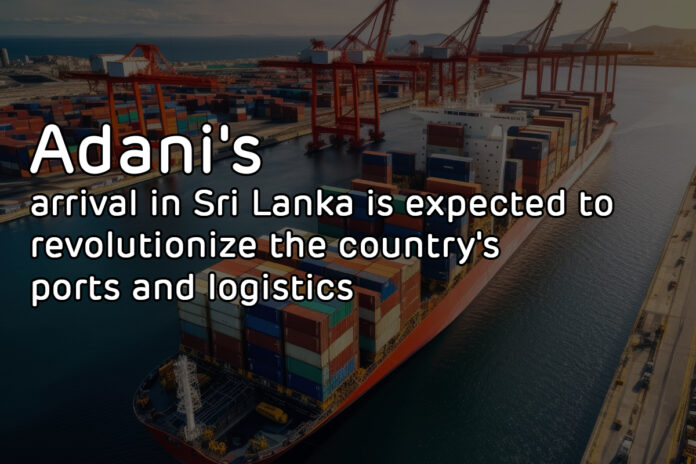Recently, Sri Lanka has been making headlines in the global trade and investment arena due to the arrival of the group, a prominent Indian conglomerate with a significant presence in the ports and logistics sector. The development by the Adani Sri Lanka group has sparked optimism and excitement among Sri Lankans and industry experts. The appearance of Adani can bring development through upgraded ports, enhanced trade, job creation, and the transfer of technology and skills, benefiting the country’s economy.
Adani coming to Sri Lanka might bring changes in the ports and logistics, along with modernization and expansion chances for the country. The board most likely says that this project, in just two years, can generate 2,000 jobs along with originating an electricity capacity of 350 MW.
How the Adani Sri Lanka project is a boon for Sri Lanka’s port infrastructure?
Adani’s entry into Sri Lanka’s port sector promises to modernize and upgrade the country’s port infrastructure. The group’s expertise and experience in handling large-scale port projects worldwide will likely bring state-of-the-art technology and best practices to Sri Lanka’s ports. This advancement could mean faster and more efficient cargo handling, reducing waiting times for ships and increasing the overall capacity of the ports. With Adani’s expertise, ports will become modern and efficient, handling more cargo faster.
This cargo facility will improve trade connectivity, attract investments, and create job opportunities. The project’s technology transfer will help local workers learn new skills, contributing to their professional growth. Upgraded ports will enhance Sri Lanka’s competitiveness globally, making it an attractive destination for businesses.
The Adani Sri Lanka project is set to unleash new job opportunities for the country and strengthening trade connectivity
The expansion and development of ports often come hand-in-hand with increased job opportunities. The Adani Sri Lanka investment is expected to create around 2000 jobs, benefiting local communities and contributing to economic growth. From skilled dockworkers and administrative personnel to support services, the project’s impact on job creation is anticipated to be significant, benefiting local counties and fostering a more prosperous future. It will foster growth and prosperity.
Sri Lanka’s strategic geographical location makes it a key maritime hub in the Indian Ocean. Adani’s presence will likely enhance trade connectivity by improving links between Sri Lanka and other major regional ports. This increased connectivity can boost Sri Lanka’s role as a transhipment hub, attracting more shipping lines and businesses to utilize its ports for trade. With modernized facilities, ships can dock and unload faster, improving import and export efficiency.
This modernization can attract more businesses to use Sri Lanka as a transhipment hub, connecting the country to global markets and fostering trade growth and economic development.
Sri Lanka’s competitiveness in the global market is expected to improve significantly
With the modernization of port facilities and logistics operations, Sri Lanka’s competitiveness in the global market is expected to improve significantly. Efficient ports and logistics networks can reduce business costs, attract more foreign investments, and enhance the overall ease of trade for importers and exporters. Faster cargo handling and streamlined operations will reduce costs and attract more investments. Businesses will find it easier to trade, boosting Sri Lanka’s position in the global market and driving economic growth.
Faster cargo handling and streamlined operations will make Sri Lanka an attractive investment destination for businesses, fueling economic growth. Due to this project the G.D.P. increases by around 6% each year.
How will the Adani Sri Lanka project bolster the country’s economic growth?
The project will bolster the country’s economic growth in various ways:
- Modernizing ports and logistics will attract more businesses and increase trade activities. This influx of trade will boost government revenues through taxes and fees.
- The project’s job creation will provide income to local communities, leading to increased consumer spending.
- Improved trade connectivity will attract foreign investments, further stimulating economic growth.
- With enhanced efficiency in cargo handling, businesses can import and export goods more effectively, expanding their reach to new markets.
The project’s positive impact on trade, job opportunities, and investments will drive Sri Lanka’s economic prosperity. A robust and efficient ports and logistics sector can have a ripple effect on the economy. As trade and investment flourish, businesses across various sectors can expand their reach and find new markets for their goods and services. This expansion, in turn, leads to increased economic growth and higher government revenues that can be reinvested in public services.
The Adani Sri Lanka project could be a game-changer for the country. The benefits could be far-reaching, from modernizing port infrastructure to creating jobs and strengthening trade connectivity. However, ensuring that this collaboration is carried out responsibly is crucial, focusing on sustainable development and equitable growth.

















